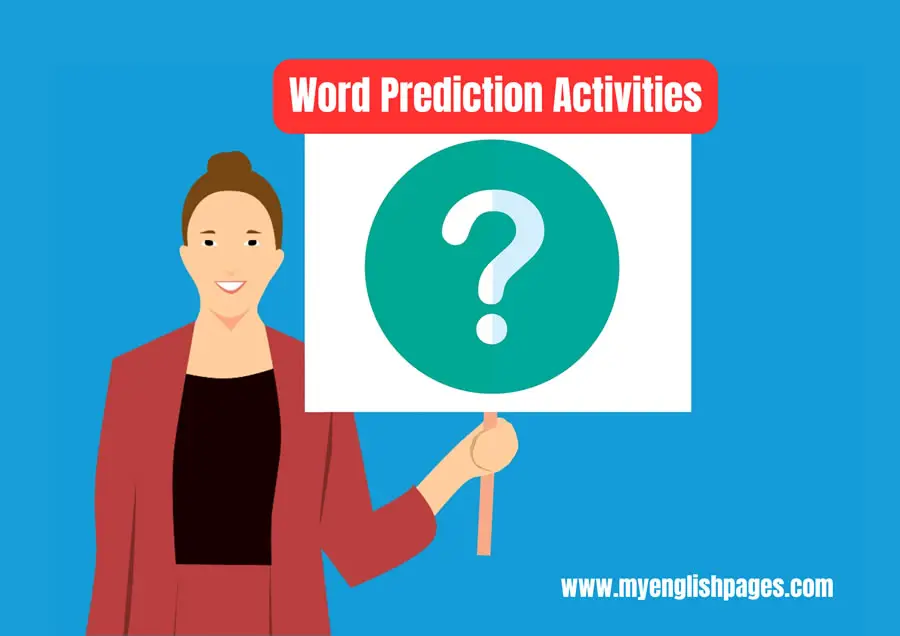Table of Contents
Introduction
Students learn vocabulary most effectively when they are actively involved in the learning process. Simply spoon-feeding definitions is often less impactful. When students collaborate to think critically, explore the relevance of words to a specific topic, and make decisions about word meanings, they not only enhance long-term retention but also cultivate independent learning skills.
This post explores learner-centered word prediction activities that engage students in active learning.
Vocabulary Prediction Lesson Plan
This lesson plan is designed to enhance students’ vocabulary knowledge and activate words related to specific semantic fields. These activities can serve as pre-reading exercises or as engaging games to deepen understanding and anticipation of vocabulary.
Lesson Overview
Word Prediction Lesson Plan
Level:
Intermediate to Advanced ESL/EFL students
Objectives:
By the end of the lesson, students will be able to:
- Predict vocabulary items related to a specific topic.
- Explain their rationale for choosing certain words.
- Activate and expand their vocabulary within a specific semantic field.
- Improve their ability to anticipate content in reading passages.
Materials:
- Whiteboard and markers
- Printed reading passages related to the chosen topic
- A list of words (for the vocabulary prediction variation)
- Timer (for the prediction game)
- Optional: Graphic organizers for categorizing vocabulary
Duration:
- The pre-reading activities: 10-15 minutes
- The Vocabulary Prediction Game: 10-15 minutes
Word Prediction Activities

The following word prediction activities can be integrated into a reading comprehension lesson or used as a standalone vocabulary exercise. These activities foster discussion, promote collaborative learning, and enhance critical thinking skills among students.
1. Pre-Reading Word Prediction Activity 1
- Introduce the Topic:
- Begin by telling the students that they will be reading a text about a specific topic, such as the environment.
- Write the topic on the board to focus students’ attention.
- Vocabulary Prediction:
- Ask students to predict which vocabulary words might appear in the passage.
- Write the suggested words on the board and invite students to explain why they chose these words or what they think the words mean.
- Reading and Verification:
- Provide the students with the passage and ask them to read it.
- As they read, students should check if their predicted words appear in the text.
2. Pre-Reading Word Prediction Activity 2
Alternatively, you may try this prediction activity:
Instructions:
- Write a list of words on the board or provide students with a worksheet containing the list.
Group Work:
- Ask students to work in pairs or small groups to predict which words are likely to appear in the text and which may not be related to the topic.
Discussion:
- Encourage students to debate and discuss their predictions within their groups, making decisions about the list.
- Students can also teach each other the meanings of difficult words or consult a dictionary.
Reading and Checking:
- Once the time is up, have students read the text to check their predictions.
3. Pre-Reading Word Prediction Activity 2
Predicting the topic of a text based on a list of words can be an effective way to engage students in vocabulary prediction:
- Write Key Words: Start by writing key words related to a topic on the board.
- Topic Prediction: Ask students to predict the topic of the text based on these words.
- Title Check: Have students read the title of the text to verify their predictions.
- Vocabulary Prediction: After confirming the topic, students work in small groups to predict additional vocabulary items related to it.
- Group Collaboration: Representatives from each group write the words they believe will appear in the text on the board.
- Read and Verify: Students then read the text to check their predictions.
4. Vocabulary Lesson Prediction Game
- Group Formation:
- Divide the class into small groups.
- Word Generation:
- Give each group a short amount of time to generate as many words as possible related to a given topic.
- Comparison and Defense:
- After the time is up, have the groups compare their lists.
- Each group should explain or defend their choice of words, discussing why they believe these words are relevant to the topic.
Why Are Word Prediction Activities Effective?
The key element in these activities is the explanation process. By articulating their choices, students refine their understanding of vocabulary and activate related words within the same semantic network. This process not only deepens their grasp of specific words but also improves their ability to access related vocabulary automatically.
- Encourages Critical Thinking: Students analyze and evaluate words, fostering deeper understanding and engagement.
- Activates Prior Knowledge: Helps students connect new vocabulary with what they already know, making learning more meaningful.
- Promotes Collaboration: Group work allows students to discuss and refine their predictions, enhancing communication skills.
- Enhances Vocabulary Retention: Actively predicting words aids in long-term memory retention compared to passive learning.
- Improves Comprehension: Anticipating vocabulary primes students for better understanding of the text they are about to read.
- Fosters Independent Learning: Students develop strategies to deduce meanings and relevance, encouraging autonomy in learning.
Conclusion
Word prediction activities are a powerful tool in vocabulary instruction and reading comprehension. By engaging students in predicting and discussing vocabulary, these activities promote critical thinking, activate prior knowledge, and encourage collaboration.
They not only enhance vocabulary retention but also improve overall text comprehension and foster independent learning.
Integrating these activities into lessons allows students to take an active role in their learning process, making their educational experience more dynamic and effective.


